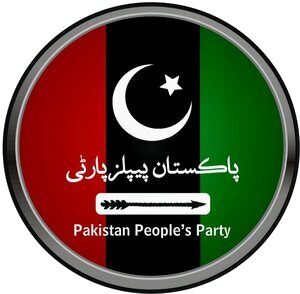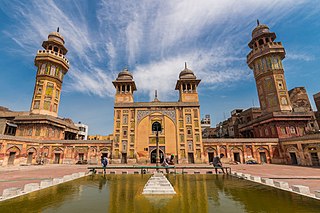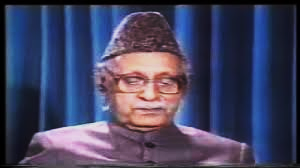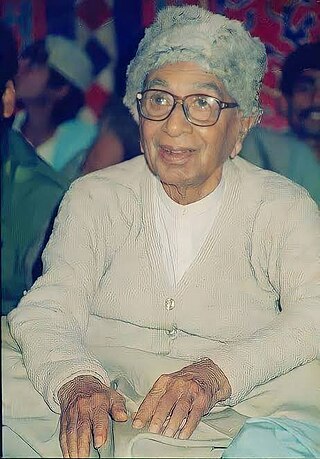Literature of Kashmir has a long history, the oldest texts having been composed in the Sanskrit language. Early names include Patanjali, the author of the Mahābhāṣya commentary on Pāṇini's grammar, suggested by some to have been the same to write the Hindu treatise known as the Yogasutra, and Dridhbala, who revised the Charaka Samhita of Ayurveda.

The Pakistan People's Party is a centre-left political party in Pakistan. It is currently the largest party in the Senate and third-largest party in the National Assembly. The party was founded in 1967 in Lahore, when a number of prominent left-wing politicians in the country joined hands against the military rule of president Muhammad Ayub Khan, under the leadership of Zulfikar Ali Bhutto. It is affiliated with the Socialist International. The PPP's platform was formerly socialist, and its stated priorities continue to include transforming Pakistan into a social-democratic state, promoting egalitarian values, establishing social justice, and maintaining a strong military. The party, alongside the Pakistan Muslim League-Nawaz and the Pakistan Tehreek-e-Insaf, is one of the three largest political parties of Pakistan.

The Wazir Khan Mosque is a 17th-century Mughal masjid located in the city of Lahore, Punjab, Pakistan. The mosque was commissioned during the reign of the Mughal Emperor Shah Jahan as a part of an ensemble of buildings that also included the nearby Shahi Hammam baths. Construction of Wazir Khan Mosque began in 1634 C.E., and was completed in 1641. It is on the UNESCO World Heritage Tentative List.

The culture of Pakistan is based in the Indo-Persian cultural matrix that constitutes a foundation plank of South Asian Muslim identity. The region has formed a distinct cultural unit within the main cultural complex of South Asia, Middle East and Central Asia. There are differences in culture among the different ethnic groups in matters such as dress, food, and religion, especially where pre-Islamic customs differ from Islamic practices.
Sufi rock or Sufi folk rock is a subgenre of rock music that combines rock with classical Islamic Sufi music traditions. It emerged in the early 1990s and became widely popular in the late 1990s in Pakistan and Turkey. The term "Sufi rock" was coined in 1993 by writer Nadeem F. Paracha to define the Pakistani band Junoon, who pioneered the process of fusing conventional rock music with folk Sufi music and imagery.
Filmi pop is a term first coined by Pakistani music journalist, Ali Tim in 1990 but made famous by the country's most influential pop critic, Nadeem F. Paracha. In 1966, a talented young playback singer Ahmed Rushdi sang the first South Asian pop song ‘Ko Ko Korina’" for the film Armaan. Composed by Sohail Rana, the song was a blend of 1960s bubblegum pop, rock and roll twist music and Pakistani film music. This genre would later be termed as filmi pop. Paired with Runa Laila, the singer is considered the pioneering father of pop music, mostly hip-hop and disco, in South Asia.

Ali Azmat Pacha is a Pakistani singer-songwriter, musician and actor. He is best known as the lead singer for the influential Sufi rock band Junoon and for his subsequent solo career later followed by a career as an actor as well.
Acidity is a dystopian, cyber novelette written by Pakistani journalist and writer, Nadeem F. Paracha. Written exclusively for the website Chowk.com in 2003, it has gone on to become a controversial cult favorite among many young Pakistanis and Indians.

Ghulam Ahmad Parwez was a well-known teacher of the Quran in India and Pakistan. He posed a challenge to the established Sunni doctrine by interpreting Quranic themes with a logical approach. The educated populace held Parwez in high esteem, despite his encounter with numerous criticisms from conservative Islamic scholars throughout his tenure. The work 'Islam: A Challenge to Religion' is widely acknowledged as one of the most significant works in the history of Pakistan, according to Nadeem F. Paracha.
Pakistani popular music or shortly Pak-pop music refers to popular music forms in Pakistan. Pakistani pop is a mixture of traditional Pakistani classical music and western influences of jazz, rock and roll, hip hop and disco sung in various languages of Pakistan, including Urdu. The popularity of music is based on the individual sales of a single, viewership of its music video or the singer's album chart positions. Apart from within Pakistan, Pakistani pop music has also achieved an influential following and popularity in neighboring countries and is listened by members of the Pakistani diaspora, especially in the Middle East, Europe and North America.
Music '89 was the first ever all pop music stage-show to be aired on Pakistan TV.

Ghulam Murtaza Syed, known as G. M. Syed was a prominent Sindhi politician, who is known for his scholarly work, passing only constitutional resolution in favor of the establishment of Pakistan from British India's Sindh Assembly in 1943. Later proposing ideological groundwork for separate Sindhi identity and laying the foundations of Sindhudesh movement. He is regarded as one of the founding fathers of modern Sindhi nationalism.
Pakistan is an ethnically and linguistically diverse country. The major Pakistani ethnolinguistic groups include Punjabis, Pashtuns, Sindhis, Saraikis, Muhajirs, Balochs, Hindkowans/Hazarewals, Brahuis, Meos, and Kohistanis with significant numbers of Shina, Baltis, Kashmiris, Paharis, Chitralis, Torwalis, Hazaras, Burusho, Wakhis, Kalash, Siddis, Uzbeks, Nuristanis, Pamiris, Kyrgyz, Turkmen, Uyghurs and various other smaller minorities.

The Muhajir people are Muslim immigrants of various ethnic groups and regional origins, and their descendants, who migrated from various regions of India after the 1947 independence to settle in the newly independent state of Pakistan. The community includes those immigrants' descendants, most of whom are settled in Karachi and other major urban centres of Pakistan.
Beena Sarwar is a Pakistani journalist, artist and filmmaker focusing on human rights, media and peace.

Saghar Siddiqui, was a Pakistani Urdu poet. Also known as a Saint poet, homeless Siddiqui was found dead on a street corner of Lahore at age 46. His dog also died a year later, reportedly at the same spot.
Conservatism in Pakistan generally relates to the traditional, social, and religious identities in the politics of Pakistan. American historian Stephen Cohen describes several political constants in Pakistan's conservatism: respect for tradition, the rule of law and the Islamic religion which is integral in the idea of Pakistan.
Nadeem Farooq Paracha, also known as NFP, is a Pakistani journalist, author, cultural critic, satirist, and historian. He is a columnist for Pakistan's largest English-language daily Dawn.

Masroor Anwar was a ghazal poet, film song lyricist and a film screenwriter. He wrote the lyrics for 'Ko Ko Korina', South Asia's first pop song, and working alongside Sohail Rana, film director Pervez Malik and film producer and actor Waheed Murad in the 1960s, was part of the country's golden age of cinema helping establish Karachi as a major hub for film production.








